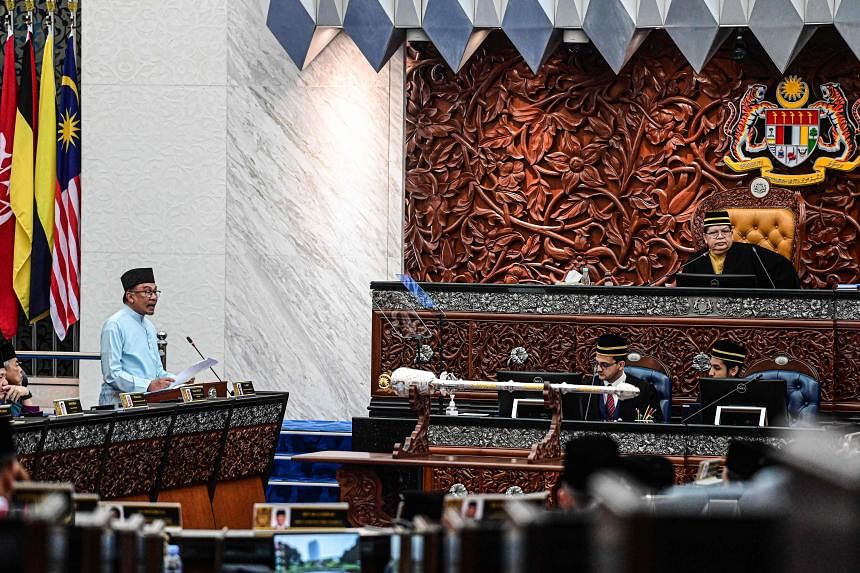KUALA LUMPUR - The Malaysian government’s ability to meet its revenue targets will prove crucial to the delivery of Prime Minister Anwar Ibrahim’s maiden federal Budget, which is also the biggest to date at RM388.1 billion (S$118 billion).
Economists noted that with Datuk Seri Anwar avoiding the implementation of a goods and services tax (GST) and maintaining large welfare handouts at a time of high debt, the government would have to source for other revenue streams.
Mr Anwar on Friday announced a slew of new measures that could potentially broaden government revenue – such as a luxury goods tax, capital gains tax, a tax on electronic cigarettes and vaporisers, and also a year-long penalty moratorium for late taxpayers which would encourage them to pay their backdated taxes.
The Premier, however, announced tax cuts for low and middle-income groups, with the government bridging the shortfall by raising taxes for the high-income group. Despite that, its net tax revenue will drop by RM900 million.
“This is a budget that is inclusive. There are elements of taxing the wealthy, reducing inequality, and helping the poor,” said Mr Amarjeet Singh, Asean tax leader for Ernst & Young.
“The PM has said that this is not the right time to implement GST, so there are new areas of tax and revenue streams.”
However, an eventual implementation of GST is “a matter of time”, as the government continues to grapple with a RM1.5 trillion national debt and liabilities, coupled with forecasted global economic headwinds in 2023 which could affect revenue projections, said Mr Amarjeet.
Socio-Economic Research Centre (Serc) executive director Lee Heng Guie said that the government’s challenges in having a sustainable revenue stream to meet high commitments and expenditure obligations remain.
He noted that the current narrow tax revenue base in Malaysia is “unsustainable”.
“Malaysia’s tax revenue to gross domestic product (GDP) ratio of 11.6 per cent in 2023 is low compared to the Asia-Pacific region (19.1 per cent),” he told The Straits Times.
Mr Lee warned that the accuracy of the government’s budgetary estimates will depend on federal revenue collection.
Mr Anwar announced on Friday that revenue for 2023 is expected to be RM291.5 billion, only one per cent lower than the RM294.4 billion in 2022, which already had a high revenue base with a 25 per cent jump from 2021.
Mr Lee said the government’s projections despite an expected economic downturn in 2023 means that there are “risks to the budget deficit”.
Mr Anwar also targeted a 5.0 per cent budget deficit, lower than the 5.6 per cent deficit recorded in 2022.
The government is estimating a 4.5 per cent growth in Malaysia’s economy this year, even though the economic growth is expected to normalise due to rising inflation and economic challenges.
Serc’s own estimates put economic growth at 4.1 per cent in 2023.
“Moderating exports, the dampening impact of inflation and higher cost of living, as well as higher interest rate will weigh on domestic demand,” Mr Lee said, adding that the government has to confront “difficult trade-offs”.
Mr Anwar became Premier in November 2022 after a general election that produced no clear winner, forcing him to stitch up an alliance between several parties to form a government, headed primarily by his Pakatan Harapan (PH) coalition and former arch rival Barisan Nasional (BN).
The government is expected to face its first litmus test when PH and BN contest as a team in six state elections to be held around July, while facing the opposition Perikatan Nasional coalition, which had secured a majority of Malay votes in the national polls.


